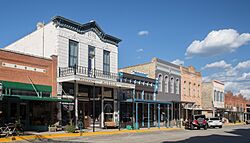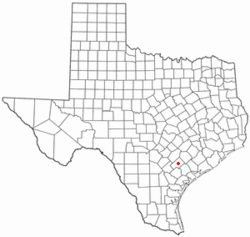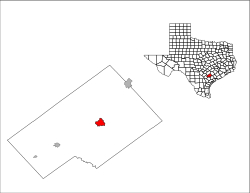Cuero, Texas facts for kids
Quick facts for kids
Cuero, Texas
|
|
|---|---|

Cuero Commercial Historic District
|
|
| Nickname(s):
Turkey Capital
|
|
| Motto(s):
History, Heritage, Hospitality
|
|

Location of Cuero, Texas
|
|
 |
|
| Country | United States |
| State | Texas |
| County | DeWitt |
| Area | |
| • Total | 6.58 sq mi (17.05 km2) |
| • Land | 6.56 sq mi (17.00 km2) |
| • Water | 0.02 sq mi (0.05 km2) |
| Elevation | 184 ft (56 m) |
| Population
(2020)
|
|
| • Total | 8,128 |
| • Density | 1,254.72/sq mi (484.45/km2) |
| Time zone | UTC-6 (Central (CST)) |
| • Summer (DST) | UTC-5 (CDT) |
| ZIP code |
77954
|
| Area code(s) | 361 |
| FIPS code | 48-18092 |
| GNIS feature ID | 1377543 |
Cuero (pronounced KWAIR-oh) is a city in Texas, United States. It is the main town, or county seat, of DeWitt County. In 2020, about 8,128 people lived there.
Contents
History
Cuero started in the mid-1800s. It was a stop along the Chisholm Trail, a famous path for moving cattle to Kansas. The town was officially founded in 1873 by Gustav Schleicher.
The name "Cuero" comes from a Spanish word meaning "hide." This refers to leather made from animal hides. However, this industry did not last long. Instead, ranching became very important. After the Civil War, the city saw some conflicts between different families.
Cuero grew a lot in the 1870s and 1880s. Many people moved here from Indianola, a coastal town. Their homes were destroyed by big hurricanes. Later, Cuero became famous for raising turkeys. Today, farming and ranching are still the main jobs in the area. Cuero is known as a top place for raising and shipping cattle in Texas.
Geography
Cuero is located in the eastern part of DeWitt County. It sits near where Sandies Creek flows into the Guadalupe River.
Several major roads pass through Cuero. These include U.S. Routes 87, 77 Alternate, and 183. These roads connect Cuero to other cities like Victoria (about 28 miles southeast) and San Antonio (about 87 miles west).
The city covers about 6.58 square miles (17.05 square kilometers). Most of this area is land, with a small amount of water.
Climate
Cuero has a warm climate. Summers are hot and humid, while winters are usually mild or cool. This type of weather is called a humid subtropical climate.
The city gets about 34.22 inches (869 mm) of rain each year. Snow is very rare in this area.
| Climate data for Cuero, Texas (1991–2020 normals, extremes 1901–present) | |||||||||||||
|---|---|---|---|---|---|---|---|---|---|---|---|---|---|
| Month | Jan | Feb | Mar | Apr | May | Jun | Jul | Aug | Sep | Oct | Nov | Dec | Year |
| Record high °F (°C) | 92 (33) |
98 (37) |
99 (37) |
99 (37) |
103 (39) |
111 (44) |
110 (43) |
114 (46) |
113 (45) |
101 (38) |
98 (37) |
92 (33) |
114 (46) |
| Mean daily maximum °F (°C) | 66.3 (19.1) |
68.9 (20.5) |
75.2 (24.0) |
82.1 (27.8) |
88.6 (31.4) |
94.1 (34.5) |
96.9 (36.1) |
98.3 (36.8) |
92.9 (33.8) |
85.9 (29.9) |
75.3 (24.1) |
67.4 (19.7) |
82.7 (28.2) |
| Daily mean °F (°C) | 54.1 (12.3) |
57.2 (14.0) |
63.8 (17.7) |
70.4 (21.3) |
78.0 (25.6) |
83.4 (28.6) |
85.6 (29.8) |
86.2 (30.1) |
81.1 (27.3) |
72.8 (22.7) |
62.7 (17.1) |
55.4 (13.0) |
70.9 (21.6) |
| Mean daily minimum °F (°C) | 42.0 (5.6) |
45.5 (7.5) |
52.3 (11.3) |
58.7 (14.8) |
67.4 (19.7) |
72.7 (22.6) |
74.3 (23.5) |
74.1 (23.4) |
69.3 (20.7) |
59.8 (15.4) |
50.0 (10.0) |
43.5 (6.4) |
59.1 (15.1) |
| Record low °F (°C) | 9 (−13) |
12 (−11) |
18 (−8) |
31 (−1) |
41 (5) |
50 (10) |
58 (14) |
58 (14) |
42 (6) |
24 (−4) |
17 (−8) |
7 (−14) |
7 (−14) |
| Average precipitation inches (mm) | 2.33 (59) |
1.54 (39) |
2.76 (70) |
2.77 (70) |
4.41 (112) |
3.92 (100) |
2.44 (62) |
2.59 (66) |
3.57 (91) |
3.27 (83) |
2.35 (60) |
2.27 (58) |
34.22 (869) |
| Average snowfall inches (cm) | 0.0 (0.0) |
0.0 (0.0) |
0.0 (0.0) |
0.0 (0.0) |
0.0 (0.0) |
0.0 (0.0) |
0.0 (0.0) |
0.0 (0.0) |
0.0 (0.0) |
0.0 (0.0) |
0.0 (0.0) |
0.2 (0.51) |
0.2 (0.51) |
| Average precipitation days (≥ 0.01 in) | 4.5 | 4.7 | 5.1 | 4.2 | 4.8 | 5.6 | 4.1 | 4.4 | 5.5 | 3.7 | 4.2 | 4.6 | 55.4 |
| Average snowy days (≥ 0.1 in) | 0.0 | 0.0 | 0.0 | 0.0 | 0.0 | 0.0 | 0.0 | 0.0 | 0.0 | 0.0 | 0.0 | 0.2 | 0.2 |
| Source: NOAA | |||||||||||||
Demographics
| Historical population | |||
|---|---|---|---|
| Census | Pop. | %± | |
| 1880 | 1,333 | — | |
| 1890 | 2,442 | 83.2% | |
| 1900 | 3,422 | 40.1% | |
| 1910 | 3,109 | −9.1% | |
| 1920 | 3,671 | 18.1% | |
| 1930 | 4,672 | 27.3% | |
| 1940 | 5,474 | 17.2% | |
| 1950 | 7,498 | 37.0% | |
| 1960 | 7,338 | −2.1% | |
| 1970 | 6,956 | −5.2% | |
| 1980 | 7,124 | 2.4% | |
| 1990 | 6,700 | −6.0% | |
| 2000 | 6,571 | −1.9% | |
| 2010 | 6,841 | 4.1% | |
| 2020 | 8,128 | 18.8% | |
| U.S. Decennial Census | |||
In 2020, Cuero had a population of 8,128 people. There were 2,323 households and 1,472 families living in the city.
The population of Cuero includes people from many different backgrounds. Here is a look at the racial makeup of the city in 2020:
| Race | Number | Percentage |
|---|---|---|
| White (NH) | 3,063 | 37.68% |
| Black or African American (NH) | 1,199 | 14.75% |
| Native American or Alaska Native (NH) | 15 | 0.18% |
| Asian (NH) | 39 | 0.48% |
| Pacific Islander (NH) | 2 | 0.02% |
| Some Other Race (NH) | 20 | 0.25% |
| Mixed/Multi-Racial (NH) | 150 | 1.85% |
| Hispanic or Latino | 3,640 | 44.78% |
| Total | 8,128 |
Arts and culture
Cuero is known for its fun events and traditions.
Turkey Fest
The Turkey Fest is a popular local festival. During this event, people from Cuero compete in different turkey-themed activities. These events celebrate the turkeys raised in the town. Competitions include:
- Prettiest turkey contest
- Turkey toss
- Turkey trot (where actual turkeys race!)
- Turkey race
In 1972, a famous reporter named Charles Kuralt visited Cuero for his "On the Road" TV series. He even tried making turkey calls!
Christmas in Cuero
Christmas in Cuero started in 2000. It began with lighting up a gazebo in Cuero Municipal Park. Now, it has grown into a huge display with over 100 scenes. You can see Victorian and Western displays, train sets, gingerbread houses, and more. A local church also puts on a live nativity scene. This event is very important to the community.
Parks and recreation
Cuero offers many places for outdoor fun. You can find:
- A baseball complex
- A golf course
- Volleyball courts
- Tennis courts
- A basketball pavilion
- A park area with a public swimming pool
Education
Students in Cuero attend schools in the Cuero Independent School District.
- John C. French serves prekindergarten and kindergarten.
- Hunt Elementary serves grades 1–3.
- Cuero Intermediate School serves grades 4–6.
- Cuero Junior High serves grades 7–8.
- Cuero High School serves grades 9–12.
There is also St. Michael's Catholic School. This school has been teaching children in DeWitt County for over 130 years. It offers programs from prekindergarten up to grade 6.
Notable people
Many interesting people have come from Cuero, including:
- Frank Bass, a professor and inventor
- MSG Roy Benavidez, a Medal of Honor winner
- Alois Blackwell, an NFL player
- Robert E. Blake, a lawyer and athlete
- Fred Hansen, an Olympic champion in pole vaulting
- Frank Horton, a U.S. Congressman
- Henry Joseph Huck, a famous lumberman and judge
- Caesar Kleberg, a conservationist
- Barr McClellan, a lawyer and author
- Jo Morrow, an actress
- Sam Neely, a musician and writer
- Aurora Estrada Orozco, a community leader
- Robert Strait, a high-school football player
- Cody Wallace, an NFL player
- Mary Fanett Wheeler, a mathematician
- Arthur Whittington, an NFL player
- Jordan Whittington, an NFL player
Images for kids
See also
 In Spanish: Cuero (Texas) para niños
In Spanish: Cuero (Texas) para niños
 | Dorothy Vaughan |
 | Charles Henry Turner |
 | Hildrus Poindexter |
 | Henry Cecil McBay |





